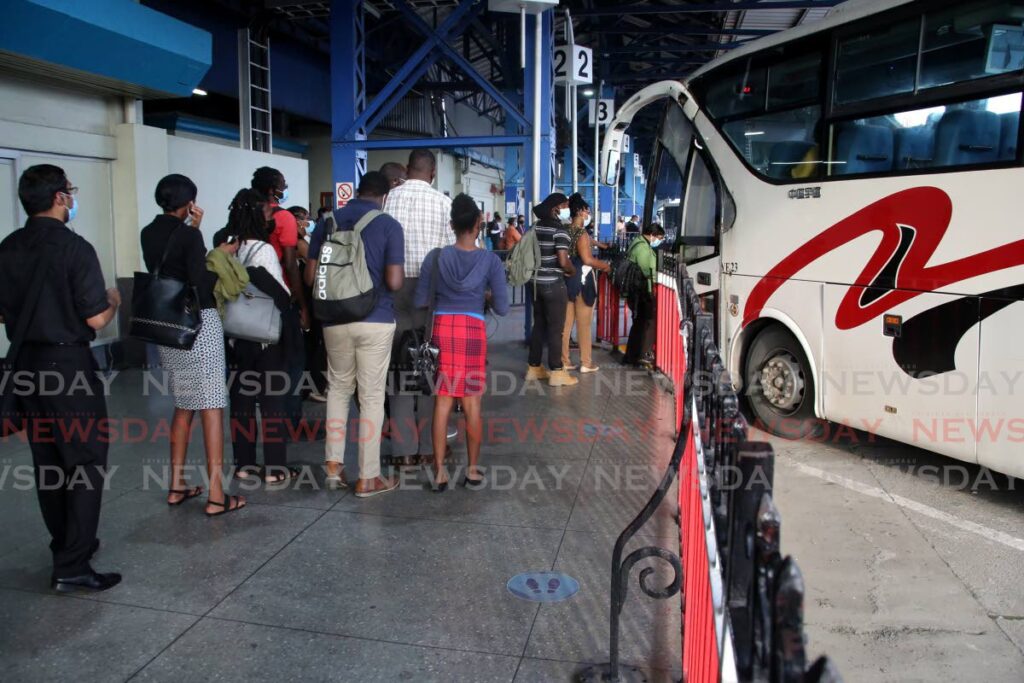PTSC passengers want more than a cheaper service

The Public Transport Service Corporation (PTSC) has been heavily promoting its low-cost services, but commuters say cheaper does not necessarily mean better. The PTSC bus service is less than half the cost of all maxi and taxi services out of Port of Spain. But some PTSC users at City Gate complain about long wait-times, services cancelled at short notice and buses in need of upkeep.
The PTSC has posted on its social media a list of bus fares for various routes.
A PTSC bus (all stops) from Port of Spain to Arima costs $2.50, meanwhile, maxi-taxis cost $10 to any location on the priority bus route. Taxis to Arima cost a bit more at $13. From Arima, PTSC's Malabar and La Horquetta services cost $3 whereas taxis cost $6 and $7, respectively.
Buses between Port of Spain and Tunapuna cost $3, otherwise maxis charge $10.
Similarly, travellers to San Juan also pay $10 on the maxi while taxis cost $5 and will increase to $6 on Thursday. Maxis to San Juan cost four times as much as the PTSC bus and the taxi costs twice as much as the bus.
Taxis to Diego Martin cost $7, the maxi costs $6 and the PTSC bus charges $3. The taxi stand is located on South Quay, Port of Spain, in front of the Museum of the City of Port of Spain and the maxis are further west on South Quay.
On Broadway near KFC, there are taxis to Chaguanas from Port of Spain which cost $15. Comparatively, PTSC buses cost $4 and maxis at City Gate cost $9.
On October 3, at City Gate, commuter Shanice Edmund, 28, was waiting for a bus to Chaguanas, but "the bus does not run on time so it forces you to use private transport. Today I trying to see if it will run on time or if I would have to pay for maxi or taxi, like normal."
Edmund said that the bus runs every hour, "but most times when I come here, it either now gone or half hour late. Last time I waited nearly three hours, and I still had to take a taxi.
"Even though gas increase, the PTSC is not reliable enough to say, I'd give up the maxis and taxis."
Edmund said she usually has a better chance to catch the morning service from Chaguanas.
"But from town, that is where the problem is."
Also on Broadway is the Port of Spain to San Fernando taxi stand. Taxis cost $22, whereas the bus to San Fernando costs $6.
Ariane Vialva Smith travelled to Port of Spain with her sister Ms Noel on the bus from San Fernando last week. They parked their car and took the coach in an effort to save fuel. This was their first time in many years using the PTSC service. Smith said the bus is always efficient – no complaints. Noel's eyes opened wide.
"We came up on the coach and the bus is deplorable."
Referring to Smith, Noel said, "The seat so bad, she nearly fall off. The seat rock back and she had to hold on to stay on the seat.
"The windows on the bus rattling and flapping in the wind. That was my experience. The time it took to arrive was good but they need to upkeep the bus."
Heading further south, passengers commuting between Port of Spain and Point Fortin via taxi face a hefty cost at $42, one way. Commuters first pay $22 to San Fernando then $20 to Point Fortin. Buses to Point Fortin cost $12 in comparison.
Commuters to Princes Town pay $30 for a direct taxi or they travel to San Fernando then to Princes Town for a total of $34. The bus costs $8.
To Fyzabad, commuters pay a taxi fare to San Fernando then an additional $15, totalling $37, whereas buses routed Port of Spain to Fyzabad cost $10.
Oftentimes, those taking the south-bound journey use the water taxi which costs $10 to San Fernando and sails twice in the afternoon.
Heading east, the PTSC bus service between Port of Spain and Sangre Grande costs $6, direct taxis cost $20 and maxis cost $15.
The PTSC bus from Sangre Grande to Toco costs $6, whereas the taxi costs $18.
From Sangre Grande to Guayaguayare, PTSC charges $8, but taxis cost $20 to Mayaro and then an additional $10 to Guayaguayare.
These are among the 79 routes Works and Transport Minister Rohan Sinanan boasted about at Standing Finance Committee of the House of Representatives on Monday.
Sinanan said the PTSC fleet has 385 buses, of these 244 were operational while 141 buses were in some stage of maintenance with 21 requiring disposal. He said there were 24 types of buses in service with many requiring different parts and problems sourcing some. He added that the PTSC will buy 300 more buses and electrical buses, as he aimed to bring the fleet to a total of 550 working buses.
Attempts to contact PTSC chairman Edwin Gooding to discuss the low fares and service were unsuccessful.


Comments
"PTSC passengers want more than a cheaper service"